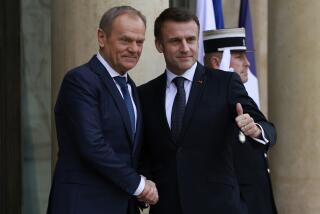Ex-Communist Sworn In as Polish Premier
- Share via
WARSAW — Former Communist Leszek Miller was sworn in as Poland’s prime minister Friday, pledging that his left-wing government will fight to create more jobs, reinvigorate the faltering economy and win acceptance into the European Union.
“We do not intend to start any new revolution or to put an end to one,” Miller said. “We want to give a boost to the economy and limit the dramatic unemployment. We want to do everything so there are as few people as possible who feel rejected in their homeland. There is a place in Poland for everyone.”
Miller’s Democratic Left Alliance rode to power in September parliamentary elections on a tidal wave of public dissatisfaction with the government, which was led by a coalition that had grown out of the anti-Communist Solidarity trade movement.
Many voters blamed the outgoing government for mismanaging reforms and turning a blind eye to corruption. Warsaw and other urban centers have boomed since the mid-1990s, fueling the growth of a consumer-oriented middle class. But most rural residents and many of the less well-educated have felt left out of the new prosperity.
The Democratic Left, which functions like any other mainstream European social democratic party, had hoped to win a big enough victory to govern without forming a coalition. But it was 15 seats short of a majority in the 460-seat lower house of Parliament, forcing it into a partnership with the Polish Peasants Party. The two parties also ran the government from 1993 to 1997.
The swearing-in ceremony for Miller, 55, and his 15 Cabinet ministers was held at the presidential palace in an ornate room with green marble columns and crystal chandeliers.
The Cabinet includes two women, Justice Minister Barbara Piwnik, a former judge who won fame for her tough stance at trials of organized-crime figures, and Education Minister Krystyna Lybacka. The office of President Aleksander Kwasniewski--who also is a former Communist--presented the female ministers with flowers, a flourish typical of his style.
Miller’s Cabinet choices, which included a respected presidential advisor, Marek Belka, as finance minister and deputy prime minister, were widely seen as intended to reassure markets that economic policy would be in responsible hands. Wlodzimierz Cimoszewicz, a former prime minister and onetime presidential candidate, was named foreign minister.
Miller put himself at the head of the body handling Poland’s negotiations on EU membership, a signal of the importance he attaches to that goal.
“I would like to say that in my opinion, there is no alternative to European integration,” Miller said. “Poland will either become a member of the European Union, or we will remain somewhere on the periphery. I will do everything for Poland to become a member.”
Some observers have questioned whether the Peasants Party would resist agricultural and other reforms needed for Poland to win EU membership, which could come as early as Jan. 1, 2004, but could be delayed years beyond that date by arguments over such issues as farm subsidies.
The failure of the Democratic Left to win an outright majority in Parliament “is regrettable because the Peasants Party is less pro-European, less reform-minded,” said Stanislaw Gomulka, a professor at the London School of Economics and a longtime advisor to Polish governments. “But I don’t think this is really a big threat.”
The new government’s most important tasks are to win EU membership and head off a budget crisis by cutting expenditures and raising taxes, Gomulka said.
Solidarity toppled communism here in 1989, and the government it led in the early 1990s was credited with implementing tough economic reforms that set Poland on the road to rapid growth. But the pain of those reforms helped trigger Solidarity’s ouster in 1993.
Solidarity-led forces regained control of the government in 1997, but as the economy dramatically slowed late last year, more and more Poles again blamed the government for mismanaging reforms. The unemployment rate passed 16% in August, a five-year high.
Outgoing Prime Minister Jerzy Buzek defended his record in a resignation speech Friday. “My government leaves office paying the political price for necessary reforms,” he said. “Undoubtedly, they require some corrections, but the most important work is already behind us.”
The outgoing coalition failed to win a single seat in the powerful lower house.
Although some question the new government’s ability to tackle Poland’s problems, no one believes that it wants to turn back the clock.
Miller has become “more realistic, more pragmatic” than he was in his days as a member of Poland’s last Politburo, said Tadeusz Iwinski, a Democratic Left member of Parliament. “I would compare him to [British Prime Minister] Tony Blair,” who has moved from the left to the center.
Many liberal observers have expressed concern, however, about the strong electoral showing in the lower house by a right-wing nationalist party, the League of Polish Families, with 38 seats, and by Self-Defense, headed by radical farm leader Andrzej Lepper. Self-Defense won 53 seats, making it the second-strongest opposition party after the moderate pro-business Civic Platform, which took 65 seats.
*
Times staff writer Holley reported from Lund, Sweden, and special correspondent Kasprzycka reported from Warsaw.
More to Read
Sign up for Essential California
The most important California stories and recommendations in your inbox every morning.
You may occasionally receive promotional content from the Los Angeles Times.













